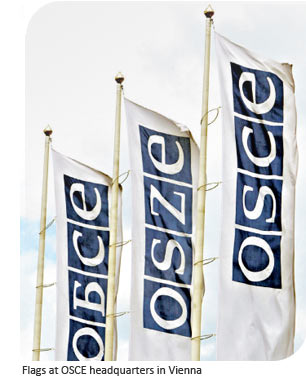  he leadership of Ukraine will rightly feel confident that their domestic and foreign policy reforms and growing stability are paying off. he leadership of Ukraine will rightly feel confident that their domestic and foreign policy reforms and growing stability are paying off.
Dozens of country members of the Organization for Security and Cooperation in Europe (OSCE) gave Ukraine a vote of confidence late last month by electing the eastern European country to lead the group in two years’ time.
The 56 foreign ministers of the world’s largest regional organization delivered the unanimous “yes” vote November 23 in Vienna, Austria, giving Ukraine the one-year-long Chairmanship of the OSCE in 2013.
The government in Kyiv had applied to lead the group five years ago.
Foreign Minister Konstantin Gryshchenko said the country won the trust of the OSCE owing to an active foreign policy led by President Victor Yanukovych and focused Ukrainian diplomacy.
The decision “confirms the role of our country in strengthening regional security and stability, the authority of the leaders, as well as the ability of the Ukrainian diplomacy to head talks on improving security in the area of its responsibility,” Gryshchenko noted after the vote by the Council of Ministers.
Yanukovych attributed the decision to the recognition of Ukraine’s democratic achievements.
An opposition minister said the OSCE rather saw value in the stability of the Ukrainian leadership.
The achievements are “in the consolidation of authority, an increase in the manageability of the government, and the elimination of conflicts within the government. Certainly, the OSCE community values these things,” said former Ukrainian Foreign Minister Petro Poroshenko.
With two years in hand to formulate a strategy, the Kiev government said it will divulge the specifics of its plan over time.
Gryshchenko, who, as Foreign Minister, is a potential chairperson of the OSCE in 2013, spoke broadly of its vision. Ukraine “will continue to carry out its constructive unifying role in the security dialogue, taking into consideration opinions of all the states of the OSCE region, and (it) will take up a balanced position in respect of the acute issues of the organization,” he said.
President Yanukovych noted that Kazakhstan’s experience as 2010 Chairman of the OSCE will be considered highly.
Ukraine’s Ambassador to Astana, Oleg Demin, concurred, saying Kiev will learn from the former Soviet Central Asian republic about setting priorities.
“Ukraine is likely to study the experience of Kazakhstan in determining its future priorities for the OSCE chairmanship in 2013 and will continue to implement developments to enhance the organization's effectiveness and credibility,” Demin said.
The Ambassador noted that the Kazakh presidency revitalized and substantialized OSCE activities, and that chief among them is the Astana summit – the first to be held in a decade.
The summit in the Kazakh capital of Astana on December 1-2 brought together presidents and prime ministers from the 56 OSCE member countries and 12 OSCE partner countries, as well as the heads of 68 international organizations.
Ukraine will use its own Chairmanship in 2013 to protect the interests of the member states.
“Chairmanship of Ukraine in the OSCE also expands its capabilities to protect national interests, given its neutral status and its voluntary renunciation of nuclear weapons,” Yanukovych said.
During his inauguration in February, the President of the ex-Soviet nation declared he will pursue an independent foreign policy without entering into alliances with Russia or the West.
Four months later Parliament passed laws underlining its non-alignment status and dropped its bid to join the NATO military bloc, which had been sought under the previous president, Viktor Yushchenko.
OSCE member Russia sees the move as being in line with the organization’s purpose of focusing on the future of European security architecture.
“In our opinion, (dropping NATO aspirations) is a logical development of events, and we believe that it meets the interests of the existing European security system. We have always maintained a simple view of Ukraine's accession to NATO – it would destroy European security – it is a sensitive issue for us," Russia’s President Dmitry Medvedev said last month.
In another move that won kudos from foreign governments, President Yanukovych vowed to give up the remains of the republic’s nuclear inheritance left over from the Soviet era.
When the Soviet Union collapsed in 1991, Ukraine inherited one of the largest nuclear weapons arsenals in the world. By 1996 it had dismantled all nukes to become a non-nuclear nation.
However the eastern European country held onto a stockpile of around 200 pounds of highly enriched uranium, enough to make several nuclear weapons.
Ukraine agreed at the April nuclear security summit in Washington to get rid of its weapons-grade fuel by the time of the next nuclear summit in 2012.
The move was hailed by the US as a “landmark decision.”
Clearly Ukraine under the leadership of President Yanukovych has won the approval of the international community for its mature foreign policy attitudes, evolutionary domestic reforms, and growing stability of its governing bodies.
The OSCE expressed its confidence that Kiev will be ready to take the helm in two years, gaining lessons along the way from Lithuania and Ireland who will chair the OSCE in 2011 and 2012, respectively.
|